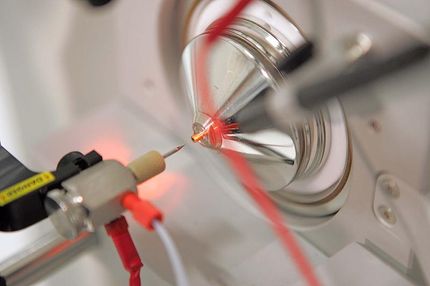Therapeutic Antibodies Show Variations
Subtle Differences: Therapeutic Antibodies Vary Depending on Production System
Differences in production methods for therapeutic antibodies can lead to variations in their structure, depending on the recombinant procedure selected. The distinctions, which are based on a number of glycosylations, even impact antibodies’ stability. This was the result of a high-precision comparison of the structural properties of antibody isotopes that were manufactured in cell cultures or plants. Equipment BOKU (EQ BOKU) based at the University of Natural Resources and Life Sciences, Vienna (BOKU) employed state-of-the-art mass spectrometers to pinpoint minute differences in the Glycosylation of immunoglobulins.
Antibodies are one of the most precise forms of medicine and are increasingly being used to combat cancer and other conditions. They are frequently produced recombinantly, with a range of different manufacturing processes in use. Each process creates an identical protein scaffold in the antibody, but there are differences in what is known as glycosylation, or modification by adding specific carbohydrates. Previously, little was known about the way in which these differences come about and the form they take. Identifying these subtle, but potentially medically significant distinctions requires extremely complex analysis, which is only possible using the latest mass spectrometry procedures. A BOKU team had access to such equipment at the university’s EQ BOKU facility and unearthed some surprising results.
Getting to the heart of the matter
The team headed by Prof. Richard Strasser is the first to identify precise differences in the glycosylation patterns of immunoglobulin A, which had been produced either in human cell cultures (HEK293) or plant systems (Nicotiana benthamiana). Prof. Strasser, a member of the Department of Applied Genetics and Cell Biology, commented: “Even we were surprised by how big the differences were. There were sharp contrasts between the two systems in terms of the structure of the carbohydrates used for glycosylation and their position on the proteins.”
With the help of ultra-modern techniques called capillary reversed-phase chromatography and electrospray mass spectrometry provided by EQ, the team managed to analyse glycosylation in each system down to the finest detail. They found that the immunoglobulin A produced in the HEK293 cell culture had many more and also more complex N-glycans – a group of carbohydrates that bond with particular nitrogen atoms – than that produced in mammalian cell cultures. The immunoglobulin A manufactured in plants also had a significantly narrower range of structures. This was primarily due to the fact that plants have none of the metabolic pathways required for mammalian glycosylation. “But we also saw glycosylations in the antibodies manufactured in plants which can only occur in plants,” Prof. Strasser added.
Bonding
Although the glycosylations in the antibodies produced in N. benthamiana were purely plant-specific, the antibodies displayed the same bonding properties for antigens as those manufactured using human cells. This suggests that as far as therapeutic applications are concerned, the choice of production system makes no difference. However, further analysis by Prof. Strasser’s team revealed that the stability of immunoglobulin A varies depending on the production method – a factor which could have a decisive effect on its use in treatment. The analysis involved testing the antibodies’ thermal stability, which turned out to be lower in immunoglobulin A produced in plants. “We need to carry out further tests to discover how significant this is for the application of these antibodies in treatment,” Prof. Strasser explained.
Most read news
Topics
Organizations
Other news from the department science

Get the analytics and lab tech industry in your inbox
By submitting this form you agree that LUMITOS AG will send you the newsletter(s) selected above by email. Your data will not be passed on to third parties. Your data will be stored and processed in accordance with our data protection regulations. LUMITOS may contact you by email for the purpose of advertising or market and opinion surveys. You can revoke your consent at any time without giving reasons to LUMITOS AG, Ernst-Augustin-Str. 2, 12489 Berlin, Germany or by e-mail at revoke@lumitos.com with effect for the future. In addition, each email contains a link to unsubscribe from the corresponding newsletter.
Most read news
More news from our other portals
See the theme worlds for related content
Topic world Antibodies
Antibodies are specialized molecules of our immune system that can specifically recognize and neutralize pathogens or foreign substances. Antibody research in biotech and pharma has recognized this natural defense potential and is working intensively to make it therapeutically useful. From monoclonal antibodies used against cancer or autoimmune diseases to antibody-drug conjugates that specifically transport drugs to disease cells - the possibilities are enormous

Topic world Antibodies
Antibodies are specialized molecules of our immune system that can specifically recognize and neutralize pathogens or foreign substances. Antibody research in biotech and pharma has recognized this natural defense potential and is working intensively to make it therapeutically useful. From monoclonal antibodies used against cancer or autoimmune diseases to antibody-drug conjugates that specifically transport drugs to disease cells - the possibilities are enormous
Topic World Mass Spectrometry
Mass spectrometry enables us to detect and identify molecules and reveal their structure. Whether in chemistry, biochemistry or forensics - mass spectrometry opens up unexpected insights into the composition of our world. Immerse yourself in the fascinating world of mass spectrometry!

Topic World Mass Spectrometry
Mass spectrometry enables us to detect and identify molecules and reveal their structure. Whether in chemistry, biochemistry or forensics - mass spectrometry opens up unexpected insights into the composition of our world. Immerse yourself in the fascinating world of mass spectrometry!
Topic World Chromatography
Chromatography enables us to separate, identify and thus understand complex substances. Whether in the food industry, pharmaceutical research or environmental analysis - chromatography opens up a treasure trove of information about the composition and quality of our samples. Discover the fascinating world of chromatography!

Topic World Chromatography
Chromatography enables us to separate, identify and thus understand complex substances. Whether in the food industry, pharmaceutical research or environmental analysis - chromatography opens up a treasure trove of information about the composition and quality of our samples. Discover the fascinating world of chromatography!






















































